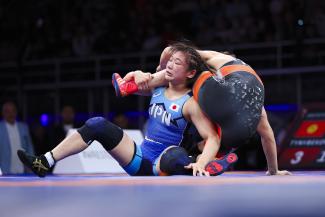NF Roundup: Nov. 23-27 (Updated)
Monday, November 23, 2020 - 14:13 By United World Wrestling Press
The Uzbekistan women's national team doing joint training at the Yangiabad Sports Base in Tashkent, Uzbekistan, from Nov. 21 - Dec. 11.


The Uzbekistan's freestyle national team doing joint training at the Dinamo Sports Base in Tashkent, Uzbekistan, from Nov. 25 - Dec. 9.



Iranian wrestling great Mohammad KHADEM passed away at the age of 85. Khadem served as Iran's national team coach for several years and was a 1962 world silver medalist as a competitor.
Khadem was the father of Iranian champions Rasul and Amir Reza. He helped his sons achieve Olympic and world medals in freestyle wrestling. Mohammad Khadem coached his son Rasul in the final match of the 1996 Olympics against legendry Makharbek KHADARTSEV (USSR).
Rasul was an Olympic champion in 1996 and claimed a bronze medal at the 1992 Olympics. He also won two gold medals and one silver medal at the world championships.
Amir Reza was a two-time Olympic medalist, winning bronze medals in 1992 and 1996. He was also a 1991 world champion and 1990 world bronze medalist.
United World Wrestling and the wrestling community offer its condolences to the family and friends of Mr. Khadem and the Iranian Wrestling Federation.

The Romanian Wrestling Federation this week is celebrating their 90th year on the mats. The official founding papers were signed in the city of Oradea in 1930.
Currently the Romanian Wrestling Federation is one of the top federations in the nation placing 5th in the all-time medal count for Olympic Games and World Championships.

The Wrestling Federation of Uzbekistan has completed its national tournament for Greco-Roman, women's wrestling and freestyle. The six day event will help determine who can compete in the 2021 tournaments on the UWW calendar.
Highlights from matches in the Greco-Roman tournament are below.

by Ikuo Higuchi, JWF // Photo Courtesy of RIZIN
Rio Olympic silver medalist and reigning world champion Shinobu OTA (JPN) will put his Greco-Roman skills to the test in mixed martial arts (MMA) by taking to the ring in a RIZIN Fighting Federation extravaganza on New Year's Eve.
Ota, who won the 63kg world title last year in Kazakhstan, used the occasion of an MMA event in Osaka on Nov. 21 to announce his entry in the Dec. 31 event to be held at Saitama Super Arena, north of Tokyo.
Ota appeared in the ring along with his opponent, veteran MMA fighter Hideo TOKORO. The 43-year-old Tokoro has been competing for nearly two decades.
"I am Shinobu Ota from the wrestling world," Ota said by way of introduction to the crowd at Osaka Castle Hall. "I was surprised at first to learn I would be fighting Tokoro at the RIZIN event on New Year's Eve.
"He is a fighter I have been watching since I was little, so I am apprehensive [about facing] a fighter who I really like. But when the fight starts, it's a different story. I will prepare so that I can score a decisive victory."
The 26-year-old Ota had joined in workouts with MMA groups in the past. "I have a little trepidation, but I have no intention of losing," he said. "I want this to lead to bigger things."
Ota started wrestling at the Hachinohe Kids in Aomori Prefecture, one of the top kids clubs in the country. He went on to great success at Yanai Gakuin High School in Yamaguchi Prefecture and Yokohama-based Nippon Sports Science University, winning a string of titles.
In 2015, he won his first All-Japan championship, and the following year he became Japan's first Olympic medalist in Greco-Roman in 16 years, beating the 2012 London gold medalist en route to the 59kg silver in Rio.
After failing to make Japan's team in the Olympic weight class of 60kg for last year's world championships, Ota moved up to 63kg and won out in the qualifying process to earn a ticket to the Kazakh capital of Nur-Sultan in that division. He defeated the defending champion to secure his first world gold medal.
After that, he made an attempt to qualify for the Tokyo Olympics in the next weight class of 67kg, but came up short at the All-Japan Championships in December last year, closing off his path to the Tokyo Games. In September, he resigned from his company ALSOK in preparation for his new challenge.
There are currently many fighters in MMA with wrestling backgrounds. Henry CEJUDO (USA), a freestyle gold medalist at the 2008 Beijing Olympics, achieved titles in two weight classes in Ultimate Fighting Championsip (UFC), which is regarded as the highest level of MMA.
Amir ALIAKBARI (IRI), a 2010 Greco world champion, also found success on the RIZIN circuit. Daniel CORMIER (USA), who finished fourth in freestyle at the 2004 Athens Olympics, went on to shine in UFC, winning both the light heavyweight and heavyweight belts.
When it comes to reigning world or Olympic champions getting involved in MMA, there are several examples.
In February 1999, superstar Alexandre KARELIN (RUS), with a combined 11 consecutive global Greco titles at the worlds and Olympics to his name, fought in a Fighting Network RINGS event in Japan, defeating Akira MAEDA by decision. At the time, MMA bouts were fought with bare hands.
In December 2004, Athens Olympic Greco-Roman champion Karam IBRAGIM (EGY) fought at a K-1 Premium Dynamite event in Japan, but lost by KO to Tomoyuki FUJITA, a former freestyle wrestler who went on to a successful career in pro wrestling and MMA.
In both cases, the wrestlers were aiming for the next Olympics and their forays into MMA were seen as one-off outings. Neither fought in MMA again.
Thus it can be said that Ota will be the first reigning world champion to switch to MMA.


Share your thoughts.
Comments